#literary criticism
Text
The true post-cyberpunk hero is a noir forensic accountant

I'm touring my new, nationally bestselling novel The Bezzle! Catch me in TOMORROW (Apr 17) in CHICAGO, then Torino (Apr 21) Marin County (Apr 27), Winnipeg (May 2), Calgary (May 3), Vancouver (May 4), and beyond!

I was reared on cyberpunk fiction, I ended up spending 25 years at my EFF day-job working at the weird edge of tech and human rights, even as I wrote sf that tried to fuse my love of cyberpunk with my urgent, lifelong struggle over who computers do things for and who they do them to.
That makes me an official "post-cyberpunk" writer (TM). Don't take my word for it: I'm in the canon:
https://tachyonpublications.com/product/rewired-the-post-cyberpunk-anthology-2/
One of the editors of that "post-cyberpunk" anthology was John Kessel, who is, not coincidentally, the first writer to expose me to the power of literary criticism to change the way I felt about a novel, both as a writer and a reader:
https://locusmag.com/2012/05/cory-doctorow-a-prose-by-any-other-name/
It was Kessel's 2004 Foundation essay, "Creating the Innocent Killer: Ender's Game, Intention, and Morality," that helped me understand litcrit. Kessel expertly surfaces the subtext of Card's Ender's Game and connects it to Card's politics. In so doing, he completely reframed how I felt about a book I'd read several times and had considered a favorite:
https://johnjosephkessel.wixsite.com/kessel-website/creating-the-innocent-killer
This is a head-spinning experience for a reader, but it's even wilder to experience it as a writer. Thankfully, the majority of literary criticism about my work has been positive, but even then, discovering something that's clearly present in one of my novels, but which I didn't consciously include, is a (very pleasant!) mind-fuck.
A recent example: Blair Fix's review of my 2023 novel Red Team Blues which he calls "an anti-finance finance thriller":
https://economicsfromthetopdown.com/2023/05/13/red-team-blues-cory-doctorows-anti-finance-thriller/
Fix – a radical economist – perfectly captures the correspondence between my hero, the forensic accountant Martin Hench, and the heroes of noir detective novels. Namely, that a noir detective is a kind of unlicensed policeman, going to the places the cops can't go, asking the questions the cops can't ask, and thus solving the crimes the cops can't solve. What makes this noir is what happens next: the private dick realizes that these were places the cops didn't want to go, questions the cops didn't want to ask and crimes the cops didn't want to solve ("It's Chinatown, Jake").
Marty Hench – a forensic accountant who finds the money that has been disappeared through the cells in cleverly constructed spreadsheets – is an unlicensed tax inspector. He's finding the money the IRS can't find – only to be reminded, time and again, that this is money the IRS chooses not to find.
This is how the tax authorities work, after all. Anyone who followed the coverage of the big finance leaks knows that the most shocking revelation they contain is how stupid the ruses of the ultra-wealthy are. The IRS could prevent that tax-fraud, they just choose not to. Not for nothing, I call the Martin Hench books "Panama Papers fanfic."
I've read plenty of noir fiction and I'm a long-term finance-leaks obsessive, but until I read Fix's article, it never occurred to me that a forensic accountant was actually squarely within the noir tradition. Hench's perfect noir fit is either a happy accident or the result of a subconscious intuition that I didn't know I had until Fix put his finger on it.
The second Hench novel is The Bezzle. It's been out since February, and I'm still touring with it (Chicago tonight! Then Turin, Marin County, Winnipeg, Calgary, Vancouver, etc). It's paying off – the book's a national bestseller.
Writing in his newsletter, Henry Farrell connects Fix's observation to one of his own, about the nature of "hackers" and their role in cyberpunk (and post-cyberpunk) fiction:
https://www.programmablemutter.com/p/the-accountant-as-cyberpunk-hero
Farrell cites Bruce Schneier's 2023 book, A Hacker’s Mind: How the Powerful Bend Society’s Rules and How to Bend Them Back:
https://pluralistic.net/2023/02/06/trickster-makes-the-world/
Schneier, a security expert, broadens the category of "hacker" to include anyone who studies systems with an eye to finding and exploiting their defects. Under this definition, the more fearsome hackers are "working for a hedge fund, finding a loophole in financial regulations that lets her siphon extra profits out of the system." Hackers work in corporate offices, or as government lobbyists.
As Henry says, hacking isn't intrinsically countercultural ("Most of the hacking you might care about is done by boring seeming people in boring seeming clothes"). Hacking reinforces – rather than undermining power asymmetries ("The rich have far more resources to figure out how to gimmick the rules"). We are mostly not the hackers – we are the hacked.
For Henry, Marty Hench is a hacker (the rare hacker that works for the good guys), even though "he doesn’t wear mirrorshades or get wasted chatting to bartenders with Soviet military-surplus mechanical arms." He's a gun for hire, that most traditional of cyberpunk heroes, and while he doesn't stand against the system, he's not for it, either.
Henry's pinning down something I've been circling around for nearly 30 years: the idea that though "the street finds its own use for things," Wall Street and Madison Avenue are among the streets that might find those uses:
https://craphound.com/nonfic/street.html
Henry also connects Martin Hench to Marcus Yallow, the hero of my YA Little Brother series. I have tried to make this connection myself, opining that while Marcus is a character who is fighting to save an internet that he loves, Marty is living in the ashes of the internet he lost:
https://pluralistic.net/2023/05/07/dont-curb-your-enthusiasm/
But Henry's Marty-as-hacker notion surfaces a far more interesting connection between the two characters. Marcus is a vehicle for conveying the excitement and power of hacking to young readers, while Marty is a vessel for older readers who know the stark terror of being hacked, by the sadistic wolves who're coming for all of us:
https://www.youtube.com/watch?v=I44L1pzi4gk
Both Marcus and Marty are explainers, as am I. Some people say that exposition makes for bad narrative. Those people are wrong:
https://maryrobinettekowal.com/journal/my-favorite-bit/my-favorite-bit-cory-doctorow-talks-about-the-bezzle/
"Explaining" makes for great fiction. As Maria Farrell writes in her Crooked Timber review of The Bezzle, the secret sauce of some of the best novels is "information about how things work. Things like locks, rifles, security systems":
https://crookedtimber.org/2024/03/06/the-bezzle/
Where these things are integrated into the story's "reason and urgency," they become "specialist knowledge [that] cuts new paths to move through the world." Hacking, in other words.
This is a theme Paul Di Filippo picked up on in his review of The Bezzle for Locus:
https://locusmag.com/2024/04/paul-di-filippo-reviews-the-bezzle-by-cory-doctorow/
Heinlein was always known—and always came across in his writings—as The Man Who Knew How the World Worked. Doctorow delivers the same sense of putting yourself in the hands of a fellow who has peered behind Oz’s curtain. When he fills you in lucidly about some arcane bit of economics or computer tech or social media scam, you feel, first, that you understand it completely and, second, that you can trust Doctorow’s analysis and insights.
Knowledge is power, and so expository fiction that delivers news you can use is novel that makes you more powerful – powerful enough to resist the hackers who want to hack you.
Henry and I were both friends of Aaron Swartz, and the Little Brother books are closely connected to Aaron, who helped me with Homeland, the second volume, and wrote a great afterword for it (Schneier wrote an afterword for the first book). That book – and Aaron's afterword – has radicalized a gratifying number of principled technologists. I know, because I meet them when I tour, and because they send me emails. I like to think that these hackers are part of Aaron's legacy.
Henry argues that the Hench books are "purpose-designed to inspire a thousand Max Schrems – people who are probably past their teenage years, have some grounding in the relevant professions, and really want to see things change."
(Schrems is the Austrian privacy activist who, as a law student, set in motion the events that led to the passage of the EU's General Data Privacy Regulation:)
https://pluralistic.net/2020/05/15/out-here-everything-hurts/#noyb
Henry points out that William Gibson's Neuromancer doesn't mention the word "internet" – rather, Gibson coined the term cyberspace, which, as Henry says, is "more ‘capitalism’ than ‘computerized information'… If you really want to penetrate the system, you need to really grasp what money is and what it does."
Maria also wrote one of my all-time favorite reviews of Red Team Blues, also for Crooked Timber:
https://crookedtimber.org/2023/05/11/when-crypto-meant-cryptography/
In it, she compares Hench to Dickens' Bleak House, but for the modern tech world:
You put the book down feeling it’s not just a fascinating, enjoyable novel, but a document of how Silicon Valley’s very own 1% live and a teeming, energy-emitting snapshot of a critical moment on Earth.
All my life, I've written to find out what's going on in my own head. It's a remarkably effective technique. But it's only recently that I've come to appreciate that reading what other people write about my writing can reveal things that I can't see.

If you'd like an essay-formatted version of this post to read or share, here's a link to it on pluralistic.net, my surveillance-free, ad-free, tracker-free blog:
https://pluralistic.net/2024/04/17/panama-papers-fanfic/#the-1337est-h4x0rs

Image:
Frédéric Poirot (modified)
https://www.flickr.com/photos/fredarmitage/1057613629 CC BY-SA 2.0
https://creativecommons.org/licenses/by-sa/2.0/
#pluralistic#science fiction#cyberpunk#literary criticism#maria farrell#henry farrell#noir#martin hench#marty hench#red team blues#the bezzle#forensic accountants#hackers#bruce schneier#post-cyberpunk#blair fix
160 notes
·
View notes
Note
hello, i kno close reading aint the only way to analyse a text but im trying to find other ways of doin it but google is just givin me how to do close readings in your classroom things. idk im not a booksguy really tho id like to learn how to books better. do u have any like basic resources for ways to read a text an figure out whats goin on in it that isnt doing a close reading? thanks
Close readings are mostly associated with new criticism. This school of criticism, like every other, arose in a particular time and place and can be analysed as having arisen for a particular reason. Also like every school of criticism, it has its adherents and its detractors. But considering the "work" as its own whole, self-contained aesthetic object in the way that NC does is not the only way to read.
Some other approaches, off the top of my head, & the schools of criticism they're roughly associated with:
How does the work make you feel? What are your reactions to it? What emotions and associations does it conjure up? What is your spatial or temporal experience like reading the work (like, how does the work appear to you as something that unfolds over time, as you read it? When and how are you reading it)? How do your expectations about a certain work affect how you read? [Reader-response]
What is the economic and ideological history of the genre, form, and aesthetics of the work in question? What ideological function does the work seem to serve? Does it serve to convince its readers of anything, and if so, what political implications does its viewpoint have? What ideas of oppression, history, and the forms that resistance can take does the work present or seem to advocate for? What does it make visible or invisible, what does it make seem possible or impossible? [Marxist literary criticism / Marxist aesthetics]
When, where, and by whom was the work published? What else do we know about the author's opinions on aesthetics, politics, &c., and how do we know it? How are those opinions reflected by, or in tension with, what you see in the work? Were there any problems getting the work published, and, if so, do they have to do with the author's class or gender or politics, &c.? Where and how was the author living (richly or poorly, working as a maid in another household or employing servants or a wife to free up time for intellectual pursuits) while writing?
And, doubling down on when the work was published—what were the popular or dominant discourses about science, biology, human cognition, political economy, race, gender, war, &c. &c. when and where the author wrote and published? How does the work seem to mobilise, use, subvert, echo, further, or contest those discourses? How would the work's first readers have read it in light of the popular discourses they were familiar with? [contextualism; new historicism]
What materials was the book originally published in? Where did those materials come from? Was it cheaply or expensively made? How much was it sold for? Who would have been able to afford it? What does the form of the book (any illustrations? what's the typeface and size? margin size? hardcover or paperback?) imply about who is meant to read the work, and how they're meant to read it? What effect did the state of print technology at the time of the book's publishing have on its final form (e.g., it used to be impossible to have text and an image on the same page in a mass-produced book)? Where do the objects described in the book presumably come from, and by whose labour would they have been produced and transported? What does this say about the material lives of the characters? [Material culture studies]
What are the early notices and reviews of the book like, and where do they appear? Who wrote them and where did they publish them? Is the book mentioned in diaries and letters from around the time of its publication? How did the responses to the book change over time? How did audiences in different places, or of different demographics in other ways, respond to the book? What went into making the book accessible to new audiences over time? What extra-textual stuff (“paratext”: book covers, advertisements, interviews, reviews) influence how people read the work? [Reception history; translation studies; maybe fandom studies]
Who edited the work? How much control did the publishing house, and the publishing house's readers, have over the final format of the text? Who decided what the punctuation would be like, and where the chapter breaks would go? Who decided on the spelling (was it published at a time when spelling was standardized? Did the author's manuscript contain any idiosyncratic spellings? Did the publishing house have a house style)? Are there any ideological connotations to "correcting" this author's spelling? Was the author's manuscript typed or handwritten? Were there any problems reading their handwriting? How many versions of the manuscript were there, and how did the publishing house chuse which to work from? [Editorial theory]
These associations between methods of reading and schools of criticism are mostly just to give you terms to look up to read more. Scholars don't all necessarily belong firmly to a given school, and people often mix and match various modes of reading to be able to argue what they want to argue.
2K notes
·
View notes
Text
With the rise of booktok/booktwt, there's been this weird movement against literary criticism. It's a bizarre phenomenon, but this uptick in condemnation of criticism is so stifling. I understand that with the rise of these platforms, many people are being reintroduced into the habit of reading, which is why at the base level, I understand why many 'popular' books on booktok tend to be cozier.
The argument always falls into the 'this book means too much to me' or 'let people enjoy things,' which is rhetoric I understand -- at least fundamentally. But reading and writing have always been conduits for criticism, healthy natural criticism. We grow as writers and readers because of criticism. It's just so frustrating to see arguments like "how could you not like this character they've been the x trauma," or "why read this book if you're not going to come out liking it," and it's like...why not. That has always been the point of reading. Having a character go through copious amounts of trauma does not always translate to a character that's well-crafted. Good worldbuilding doesn't always translate to having a good story, or having beautiful prose doesn't always translate into a good plot.
There is just so much that goes into writing a story other than being able to formulate tropable (is that a word lol) characters. Good ideas don't always translate into good stories. And engaging critically with the text you read is how we figure that out, how we make sure authors are giving us a good craft. Writing is a form of entertainment too, and just like we'd do a poorly crafted show, we should always be questioning the things we read, even if we enjoy those things.
It's just werd to see people argue that we shouldn't read literature unless we know for certain we are going to like it. Or seeing people not be able to stand honest criticism of the world they've fallen in love with. I love ASOIAF -- but boy oh boy are there a lot of problems in the story: racial undertones, questionable writing decisions, weird ness overall. I also think engaging critically helps us understand how an author's biases can inform what they write. Like, HP Lovecraft wrote eerie stories, he was also a raging racist. But we can argue that his fear of PoC, his antisemitism, and all of his weird fears informed a lot of what he was writing. His writing is so eerie because a lot of that fear comes from very real, nasty places. It's not to say we have to censor his works, but he influences a lot of horror today and those fears, that racial undertone, it is still very prevalent in horror movies today. That fear of the 'unknown,'
Gone with the Wind is an incredibly racist book. It's also a well-written book. I think a lot of people also like confine criticism to just a syntax/prose/technical level -- when in reality criticism should also be applied on an ideological level. Books that are well-written, well-plotted, etc., are also -- and should also -- be up for criticism. A book can be very well-written and also propagate harmful ideologies. I often read books that I know that (on an ideological level), I might not agree with. We can learn a lot from the books we read, even the ones we hate.
I just feel like we're getting to the point where people are just telling people to 'shut up and read' and making spaces for conversation a uniform experience. I don't want to be in a space where everyone agrees with the same point. Either people won't accept criticism of their favorite book, or they think criticism shouldn't be applied to books they think are well written. Reading invokes natural criticism -- so does writing. That's literally what writing is; asking questions, interrogating the world around you. It's why we have literary devices, techniques, and elements. It's never just taking the words being printed at face value.
You can identify with a character's trauma and still understand that their badly written. You can read a story, hate everything about it, and still like a character. As I stated a while back, I'm reading Fourth Wing; the book is terrible, but I like the main character. The worldbuilding is also terrible, but the author writes her PoC characters with respect. It's not hard to acknowledge one thing about the text, and still find enough to enjoy the book. And authors grow when we're honest about what worked and what didn't work. Shadow and Bone was very formulaic and derivative at points, but Six of Crows is much more inventive and inclusive. Veronica Roth's Carve the Mark had some weird racial problems, but Chosen Ones was a much better book in terms of representation. Percy Jackson is the same way. These writers grow, not just by virtue of time, but because they were critiqued and listened to that critique. C.S. Lewis and Tolkien always publically criticized each other's work. Zora Neale Hurston and Langston Hughes had a legendary friendship and back and forth with one another's works which provides so much insight into the conversations black authors and creatives were having.
Writing has always been about asking questions; prodding here and there, critiquing. It has always been a conversation, a dialogue. I urge people to love what they read, and read what they love, but always ask questions, always understand different perspectives, and always keep your mind open. Please stop stifling and controlling the conversations about your favorite literature, and please understand that everyone will not come out with the same reading experience as you. It doesn't make their experience any less valid than yours.
#long post#literary critique#literary criticism#booktok#books & libraries#booktwitter#but yeah it’s really hard for me to embrace booktube#and BookTok when the conversations that are most prevalent#are the ones telling people to not be critical of what they’re reading#esp the ones who desparately don’t want to understand differing opinions#‘how could you not like this’ or ‘how could you hate this character’#easily#because I can#a traumatic backstory isn’t gonna erase a bad story#it isn’t going to make a character or book compelling#more trauma doesn’t make the story more complex#see: with fourth wing.#thank you for reading this long rant#congrats if you make it to the tags💀😭
1K notes
·
View notes
Text
I know the average reading comprehension on this site is zero but I'm different. I'm applying wildly inappropriate analysis lenses to popcorn media. I'm doing a queer theory reading of Horus Heresy novels. Now I'm doing feminist analysis of Warhammer 40k canon. Now I'm applying Marxist analysis to The Outsiders. Time for a historical analysis of The Locked Tomb. A post-colonial reading of the entirety of Doctor Who. A psychological anlaysis of Twilight. On the horseshoe scale of reading comprehension I'm at "so much reading comprehension that it loops back around to not understanding books at all actually". You can't stop me. I'm literary analysis Georg
#I paid many thousands of dollars for this degree#and by god i will use it#literature#Literary analysis#Literature analysis#Media analysis#literary criticism#reading#reading comprehension#meta analysis#literature major#literature memes#lit crit#media literacy
326 notes
·
View notes
Text
Dracula Daily: Lit Crit Case Study
I’m so excited that we’re all reading Dracula together. As we temporarily leave our friend Jonathan in Transylvania sans shaving mirror, to catch up with Nerd Queen Mina Murray, I thought I’d volunteer a little close reading walk-through of some of the stuff we’ve already seen. I do this as someone who has 1) seen a bunch of posts saying Don’t Panic Because of Problematic™ Elements and 2) taught Dracula in both literature and history classes because I’m that kind of nerd, I mean professor. Also, I thought it might be helpful to have an illustration of how you (yes, you!) can read and find multiple meanings in a text.
If anyone replies on this post with a variation on “the curtains are blue,” that person is getting blocked. Okay? Are we sitting comfortably? Good. Let’s talk about Jonathan Harker and Orientalism. Conveniently, we can do this using just evidence from Chapters 1-2; but you’ll be able to see more of this throughout the book. The brilliant Edward Saïd came up with the term Orientalism to describe taking “the basic distinction between East and West as the starting point for elaborate theories, epics, novels, social descriptions, and political accounts concerning ‘the Orient.’” As it happens, it is super easy to illustrate how Jonathan’s perceptions of his journey participate in Orientalism.
Ex. 1, as he enters Budapest: The impression I had was that we were leaving the West and entering the East; the most western of splendid bridges over the Danube, which is here of noble width and depth, took us among the traditions of Turkish rule.
So here is Jonathan, in the city of Budapest, which got a massive makeover just five years before, in 1892, to celebrate the 1000-year anniversary of its mythical founding. The fancy imperial architecture is fresh and shiny. Also brand new (as of 1896) is Budapest’s electrified subway, the oldest in continental Europe. But to Jonathan, he’s entering “the traditions of Turkish rule,” which have been rhetorically opposed to European liberalism since at least the late sixteenth century. Before that, it’s muddier, and early modern political realities are much more complicated than that, but I’m not going to digress here on what the history of this region actually is. What’s crucial is that, despite all this complex reality (and the subway system), for Jonathan, he crosses a bridge and BAM, rhetorical departure from the West, entry into the East, which is characterized by sensuality, superstition, and despots (who can be sensual as well as tyrannical. Remind you of anyone?)
Ex. 2, the trains: It seems to me that the further east you go the more unpunctual are the trains. What ought they to be in China?
Again, we have a simple equation here. The more East you go, the less modernity and technology you have. Orientalism 101. The Count’s elaborate and generous hospitality, too, fits the stereotypes of Oriental rulers. And we’ve already talked a lot about all the peasants and their Primitive Superstitions.™ But wait!
The Eastern peasants, with their multiple local languages and their quaint costumes and their worship at roadside shrines and their reliance on physical totems like the rosary... they are right about the way the world of the novel works, and our friend Jonathan, as it happens, is wrong. If Jonathan has a hope of surviving, he had better start relinquishing some of his respectable certainties (who is more respectable than an English solicitor with vague allegiance to the Church of England?) in favor of acknowledging the messy realities of where he finds himself. And all of this is 1) pretty explicit in the text 2) very complex in terms of how it asks us, the readers, to consider how we think about categories like modernity, civilization, and superstition.
Ta-da! See? Lit crit is meant to be fun, actually. [Take a literature or history course if you can; we’re doing this sort of thing all the time.]
3K notes
·
View notes
Text
Why, Dorian?!
*SPOILERS*
Why does Dorian kill Basil? We’re not given much of a reason beyond mad passion, a random onset of hatred:
Dorian Gray glanced at the picture, and suddenly an uncontrollable feeling of hatred for Basil Hallward came over him, as though it had been suggested to him by the image on the canvas, whispered into his ear by those grinning lips. The mad passions of a hunted animal stirred within him, and he loathed the man who was seated at the table, more than in his whole life he had ever loathed anything.
We’re not explicitly told why Dorian suddenly feels such hatred for Basil, but here’s my theory:
At this point, Dorian has well and truly gone off the deep end. The state of the portrait makes that clear (and remember, the description we’re given is of the portrait before Dorian murders someone). He’s an evil person. And Basil finally realizes that, once it sinks in that the picture is the same one he painted.
So, what does Basil do? Does he run and scream? Does he curse Dorian? Express regret that he and Dorian ever met? These are the reactions that Dorian is expecting. He’s probably gotten such reactions before, from other people whose hearts he’s broken. Remember, Dorian’s been taught to be cynical by Lord Henry, so, Dorian’s cynicism is deeply-entrenched by now. He values beautiful things because he does not value people, and maybe assumes that everyone is as bad as he is deep-down. I think he expects Basil to hate him.
Instead, Basil encourages Dorian to ask God for forgiveness, to redeem himself. That demonstrates that Basil still loves Dorian, and that Basil himself is willing to forgive Dorian. He’s also not a cynic -- he believes that everyone deserves a chance at redemption, as a Christian is supposed to. And Dorian recoils a bit. “What? I can’t be redeemed, Basil! I’m Evil with a capital E!” And, as if to prove it, Dorian stabs him. Dorian experiences the wild hatred for Basil in that moment because Basil’s reaction is dissonant. It contradicts Dorian’s worldview, and maybe makes him feel guilty for the first time in a while. Rather than deal with that, Dorian kills the last person who sincerely believed he could be better.
Also, I love the image of Dorian idly sniffing the flower and then crushing it in his hand -- he enjoys Basil’s passion for him in an indifferent and detached way, then casually destroys it.
#dorian gray weekly#dorian gray#the picture of dorian gray#basil hallward#oscar wilde#gothic literature#gothic lit#literary analysis#literary criticism
470 notes
·
View notes
Text
"I remained too stunned to think; and it was not until I began to think, that I began fully to know how wrecked I was, and how the ship in which I had sailed was gone to pieces."
- Pip, Great Expectations by Charles Dickens
#charles dickens#great expectations#literary quotations#literary quotes#literature#literary criticism#book quotations#literature quotes#book quotes#literature study notes#novel quotes#novels#novel#quotation#book quote
73 notes
·
View notes
Text
Watching Saltburn is an experience that has to happen while actively looking for the hints and symbols of Greek mythology while paying attention to the characters growth into who he is. Everything has a meaning and everything is telling us from beginning that hell will break loose.
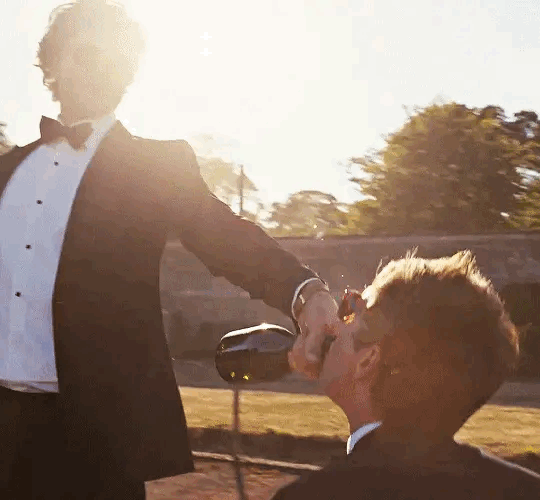
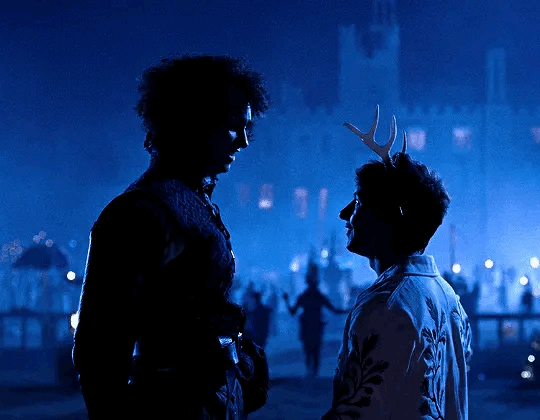
We gotta understand and see the hight difference not a directing choice for aesthetics but to represent the “difference” between Oliver and Felix family. The cousin and Felix are higher, always looking down on him. Felix being the “golden boy”, “the god”, “Apollo”, who is here to be loved and venerated by everybody. The gift represents Felix giving Oliver a taste of ambrosia, a test of what is to live with money, being part of the high class, he is feeding him/humiliating him by keeping it at hands reach. Same with the cousins that plays a role of constantly humiliating and reminding Oliver that he is a nobody and to remember that him being there is just because the “gods” allows it and that soon will be dispatched.


Clearly Felix close up is to show his sweetness and to depict Oliver’s obsession. How he see him with desire and infatuation that is actually obsession. The fact that Oliver follows him and watches him from outside his window only shows that is is obsessed and not in love. On the second gift, again we see Felix from below, making him superior and godlike, an angelic figure to be venerated.


Besides the obvious reference of blood and vampirism. Oliver is a real vampire not for sucking on blood, but because he is sucking on everyone’s life force, existence, money, and sanity. His first victim, which a transformative event, is Venetia. The young and unstable woman that feeds him secrets in exchange of her life force. From this scene we know that Oliver’s manipulative skin has started.
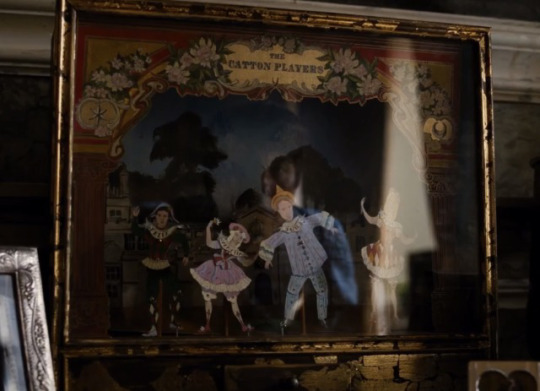
From this scene which is almost an opening scene of Oliver’s arrival to Saltburn, the director is foreshadowing Oliver’s plan and view of how all Felix’s family is an assemble of puppets, again telling us that Oliver will be pulling the strings as the puppet master.

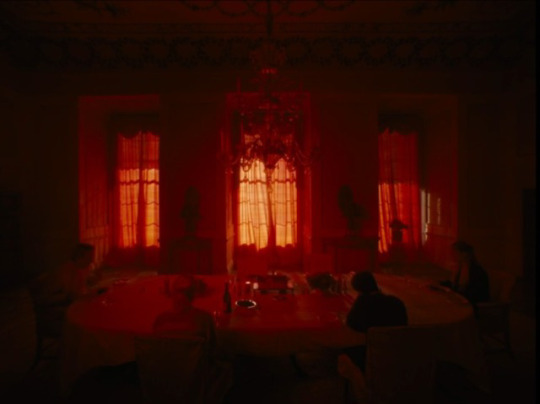
Finally the labyrinth scene with the Minotaur. We ask in that scene: who is the Minotaur? Who is Perseus? Or better said, who is getting slaughter and who is coming out alive, which we know. Finally the lunch scene when we see all true characters that are left in the dinning room with the courtains closed and the heavy red color that surrounds them is not only their bloody mood but also the symbolism of falling into hell. A symbol of death and distress that has fallen into them even during a beautiful funny day.
Also, let’s not forget that Oliver is not bisexual or at least I don’t consider him that. I see him as a deconstruction of the archetypal character of the femme fatale a character that uses es everything at their disposal even sex to get their way. Giving a hand job was just a task to get to the cousin’s phone, which was obvious to everybody that he was also in love or infatuated with Felix. also, Oliver might seem that wanted to fxck Felix but it goes beyond that, Oliver wanted to get under Felix’s skin, suck him up alive, have what Felix has… become Felix. Own Saltburn.
#saltburn#saltburn movie#Amazon prime#prime video#barry keoghan#jacob elordi#rosamund pike#farleigh#oliver quick#Felix cotton#vampire#Minotaur#labyrinth#literary criticism#movie analysis#felix catton
143 notes
·
View notes
Text

dec 18, '22: my exams are done!! now sorting out notes for the next sem.
#studyblr#study notes#studyspo#academia#dark academia#reading#english literature#literary criticism#notes#lecture notes
809 notes
·
View notes
Text
The idea that it is Bad and Terrible and you are a Bad Person when your stories involve real life events or are set during real life events, especially real life events that are most of a century ago, may be one of the weirdest and worst takes I have ever seen in my life.
#fuck the purity police#and that goes for this shit too#writing#absolute clownery#fic#fanfic#bullshit#bad media crit#bad lit crit#literary criticism#media
138 notes
·
View notes
Text

Some shelves in my new place.
#russian literature#literature#literary theory#literary criticism#philosophy#philosophy of art#philosophy of literature#art#bookshelves#books
126 notes
·
View notes
Text
i LOVE it when comedy/horror films build up tension just to destroy it dramatically, intentionally confusing the audience with many different tones; even though they aren't alike at all, i think nerdy prudes must die (NPMD) and many radio tv solutions (RTVS) streams/bits are masterclasses at this sort of form!!!
in NPMD, i mostly see richie's 'arc' as being the center point of the tension. he announces to the audience that he's dead, but this idea is quickly eclipsed as the show goes on. richie finds friends and his place once jagerman is 'gone', and the tone begins to feel eerily comfortable. when he says he loves being alive, all this anxious positivity bursts as the audience remembers his fate, and this creates a really unique atmosphere of both comedy and despair.
i could cite many RTVS bits here, but i'll just talk about breaking bad vr (BBVRAI) since it was so recent. everything RTVS does online, on and off stream, is part of their performance (duh). all of the producers/contributors of BBVRAI pushed a very obscured narrative about what the stream would be up to and on the day of the stream. in building this hype and attracting this attention, they equally built tension, and even when the stream started, they continued to build this heightened emotion until the stream title rolled. the title screen, for lack of a better term, "popped" the tension, eliciting mixed tones of comedy, disappointment/excitement, confusion, etc.
this is an interesting choice by the production teams of both NPMD and BBVRAI in that it achieves generally the same result; the audience's emotions are built to be disrupted. this disruption is intentional, and it is meant to confuse/shock/hurt/surprise/etc. it works SO WELL in horror and comedy because those emotions i listed are critical to the genres.
if you read this far, thanks :) my tumblr is kind of turning into my springboard for all the drafty analytical thoughts my little english major brain has :)
#literary analysis#literary criticism#lit crit#short essay#writing#nerdy prudes must die#npmd#starkid#starkid npmd#starkid nerdy prudes must die#radio tv solutions#rtvs#bbvrai#breaking bad vr but the ai is self aware#richie lipschitz#long post#wayneradiotv
68 notes
·
View notes
Text
Some thoughts on the topic of Byronism, Byronic Heroes, Byron himself, and Mr. Darcy, Mr. Rochester, and their respective authors...
This was inspired after I was tagged in a post (thank you @bethanydelleman !) asking whether Mr. Darcy should be considered a Byronic Hero or not. I start with my response before delving off, but I refer back at the end and it all ties in.
On Mr. Darcy: to Byronic, or not to Byronic? That is the question...
Whether or not Mr. Darcy should be considered a Byronic Hero is a complex question, as is the concept of the Byronic Hero itself.
I think there two versions of Darcy, and general pop culture tends to conflate them. There is Misunderstood Darcy (pre-"redemption" arc; aka what many think of him pre-Elizabeth's discovery of his true personality) and then there is True Darcy (post-"redemption" arc; "oh he's not rude, just socially awkward and proud"). Misunderstood Darcy has aspects of the Byronic, whereas True Darcy isn't Byronic at all.
Is Darcy Byronic? I recognize that he has Byronic elements that would make the general populace view him as Byronically aligned, so it doesn't bother me too much if people call him such, but without fully going into the debateable qualifications of the Byronic Hero, I don't think he is truly Byronic.
My interpretation of "Byronic" as a concept:
"Byronic" is not an easily defined term. A lot of academics have their own preferred methods of classifying the Byronic and there is no one fixed definition or interpretation. "Byronic" originally referred, of course, to the themes and tropes presented in the characters of Byron, who was one of the best-selling and most influential writers of the 1800s.
However, even applying the term "Byronic" solely to Byron's own corpus is an act of over-generalization. Many of Byron's purported "Byronic Heroes" are drastically different from each other or have little in common, as Byronist Peter Cochran noted in his review of Atara Stein's "The Byronic Hero in Film, Fiction and Television" (https://petercochran.files.wordpress.com/2012/07/stein-green-lapinski-ii.pdf).
I believe there are two main types of Byronic Hero: the Broad Byronic and the Byronist's Byronic.
The Broad Byronic is the modern pop cultural conception of Byronism which has been applied to practically every rebellious anti-hero. You can find thousands of articles analyzing why thousands of characters are or aren't Byronic, from Jack Sparrow to Batman to Luke Skywalker and ad infinitum. If you try hard enough, anything can be Byronic.
The Byronist's Byronic is like the Orthodox Byronic, the more traditional sense of the term. Academics who take the stritcer Byronist's Byronic approach mainly focus on Byron's direct literary descendants, like the Brontës and Pushkin, who were thoroughly obsessed with Byron and whose works/characters are directly and obviously inspired by Byron's own works. Heathcliff and Eugene Onegin are the most commonly cited examples and are Byronic by all standards.
Over time, "Byronic" has taken on a life of its own, leading to what I dubbed as "the Broad Byronic." I personally believe there is sort of a Byronic spectrum wherein I would place Heathcliff on one end and maybe Mr. Rochester on the other, considering his salvation plotline, which I feel is huge to his character and which Heathcliff lacks (as he openly declares at the end, he has no regrets for his actions).
Peter Cochran's interpretation of the Byronic Hero
Peter Cochran was a writer, professor, & one of the best Byronists (scholars of Byron) & I often defer to his opinion. His website is a haven for Byronism. His interpretation of the Byronic Hero is very much representative of the orthodox Byronist's Byronic.
In his essay "Byron's 'Turkish Tales': An Introduction," Cochan provides a brief analysis of the Byronic Hero, which I have sectioned out the most relevant parts of:
"Much has been written about him; what few writers say is that he has so many facets that it's misleading to treat him as a single archetype. [..] The Byronic hero is a human dead-end. He is never successful as a warrior or as a politician [..] he is never successful as a lover. [..] The Byronic Hero is never a husband, never a father, and never a teacher [..] He bequeaths nothing to posterity, and his life ends with him. He is to be contrasted with the Shakespearean tragic hero, who has to be something potentially life-affirming, such as a father (Lear) or a witty conversationalist (Hamlet) or a great soldier (Macbeth, Coriolanus, Antony) or a lover (Romeo, Antony). If they were not such excellent people, their stories would not be tragic. The Byronic Hero is not tragic: he's just a failure, and leads on to the Superfluous Man of Russian literature - as Pushkin demonstrated, when he created the Byronically-fixated Eugene Onegin. [..] The Byronic Hero must never be witty, or be brought in contact with a critical intelligence [..] if he were, his tale would lose its imagined grandeur [..] In his gloom, failure, and rejection of humour The Byronic Hero aligns not with the heroes of Shakespearean tragedy but with the villains of Shakespearean comedy: Shylock, Malvolio, and Jacques. [..] I would suggest that The Byronic Hero is either a closet gay, or a poorly-adjusted bisexual - a problem that Byron would have known all about."
On Mr. Rochester and Mr. Darcy
In his introduction to Charlotte Bronte's Jane Eyre: Modern Critical Interpretations, legendary literary critic Harold Bloom explained that Mr. Rochester is Charlotte Brontë taking the Byronic Hero, killing him, and then rebirthing him. I fully agree with Bloom's interpretation:
"[Rochester's] transformation heralds the death of the Byronic hero [..] Rochester is, in this sense, a pivotal figure; marking the transition from the Romantic to the modern hero [..]"
I would argue that what Austen does to Mr. Darcy is a lighter, pre-Byronic attempt at doing what Brontë did with her transformation of the Byronic in Mr. Rochester. Women growing to sympathize with rude men and then (directly or indirectly) inspiring them to change for the better. Women taking the Byronic and not just going "I can fix him," but instead "I'll tell him off, and then maybe he'll fix himself." Like Darcy, Rochester has two versions, pre-redemption and post-redemption. This is not Byronic, but their pre-redemption selves are, with Mr. Rochester being much, much more so than Darcy, and being considered an archetypal Byronic Hero (rightfully so in my opinion, his come-to-God ending aside).
Also, what Darcy and Rochester are redeemed for differs greatly; I'm not equating their moral or personal failures, and I know that Rochester clearly has more of them (if any anti-Rochester, pro-Darcy fan is out there, pls don't kill me for comparing them).
On Austen and Byron:
Austen started writing P&P when Byron was 8-years-old, so she definitely wasn't influenced by the actual Byron in creating Mr. Darcy. However, Austen did read Byron's work later on, or at least his poem The Corsair, which was his best-selling work at the time and which is one of his most cliché "Byronic" works. She did write some works, like Emma and Persuasion, after reading The Corsair, but I haven't read these yet and I'm not the biggest Austen scholar, so I don't know if she was ever actually influenced by Byron or not. I'm positive that people have analyzed this before. Lots has been written on Austen/Byron. They also shared a publisher, though they never met.
On Byronic (the writer) VS Byronic (the writer's characters):
To further confuse us, "Byronic" by its literal definition can refer to the Byronic Hero OR Byronic as in Byron the Man. Many conflate these things, but they are separate. This adds to the case of the Broad Byronic. Many of Byron's contemporaries created characters that were direct and obvious tributes or parodies of him, including Mary Shelley's The Last Man, Percy Shelley's Julian and Maddalo, and Thomas Love Peacock's Nightmare Abbey. They all knew Byron personally. Mary Shelley openly put Byron into several of her novels, as explained in "Byron and Mary Shelley" by Ernest Lovell Jr. and "Unnationalized Englishmen in Mary Shelley's Fiction" by William Brewer. Other notable examples of this are Caroline Lamb's Glenarvon (Lamb was Byron's ex) and Dr. John Polidori's The Vampyre (Polidori was Byron's doctor) in which both titular characters were/are clearly known by readers to be caricatures of Byron. The Vampyre was the first vampire novel, and was not only a caricature of Byron but also based on Byron's short story Augustus Darvell. So all modern "Byronic" vampires, including Dracula, are really Byronic as in Byron the Man, although they sometimes may overlap with the Byronic Hero. As I said, easily confusing!
As many academics (and Lord Byron himself) have noted, many of Byron's fans wrongly conflated his characters with himself. Although many of Byron's works were indeed semi-autobiographical, he himself said that they were not intended as actual depictions of himself, and that he was annoyed when people thought so. Many fans who met him would write they were shocked to find he was nothing like the Byronic Heroes of his works. He was humorous, he smiled often, he was somewhat of a dandy and much of a rake (self-confessedly), he was an aristocrat, he was considered by many to be effeminate, etc. -- all elements that are not typically expected of the Byronic Hero.
In reference to his drama The Deformed Transformed (which contains the characters Satan and Caesar) Mary Shelley wrote to him in a letter:
"The Critics, as they used to make you a Childe Harold, Giaour, & Lara all in one, will now make a compound of Satan & Caesar to form your prototype, & your 600 firebrands in Murray's hands will be in costume." [John Murray was Byron's publisher]
Here, Mary mentions how many of Byron's readers expected him to be just like his characters Harold, Giaour, & Lara, who fans assumed were his self-insert characters, as they each had strong similarities. However, these characters were more similar to "alter-egos" than actual "self-portraits." My personal interpretation is that Byron was writing these very similar dark anti-heroes and villains in order to channel the darker aspects of his subconscious, or what Jung would call his Shadow Self, to try to purge or subdue it. Though he lived before the field of psychology officially existed, Byron was very interested in all things psychological, and he used his writing as a method of self-therapy (see: Touched with Fire written by psychologist Kay Jamison, which contains one of the most thorough & reliable psychoanalyses of him).
As Bloom explains in the essay I mentioned, and as countless other academics have explained, Charlotte Brontë and many other women in the early 1800s were obsessed with Byron and his works. Byron's English-speaking fan base has always been primarily female, especially in the beginning of his career. Byron's fans wrote him letters revealing their differing interpretations of him and his Byronic Heroes (but again, most didn't really differentiate between the two).
Likewise, I think the Brontë sisters may have conflated Byron with his Byronic Heroes. Mr. Rochester is such a strong example of Byron the Man and has so many similarities to him that when reading Jane Eyre I felt like I was reading Lord Byron fanfiction. It's clear that Charlotte Brontë was familiar with his biography. For example (one of countless), in chapter 17 Rochester sings what he calls "a Corsair song" -- as I mentioned earlier, The Corsair was one of Byron's greatest hits, and Jane Eyre is set around the time The Corsair was published, and Byron also wrote songs and was also known for his good voice.
Although the Brontë sisters were each influenced by him, they took their own individual spins on the Byronic, and their works reveal the dynamicism of these themes. In my opinion, Emily employs the Byronist's Byronic most raw and faithfully (and maybe even takes it further), Charlotte punishes, redeems, and transforms the Byronic with much influence from Byron the Man, and Anne presents the Byronic most critically and realistically, asking "what if the Byronic Hero were real, and really got married -- what would that look like?" and having perhaps the most (Broadly) Byronic heroine ever, who is also later redeemed by the end, and has her veil of Byronic mystery removed much like Darcy did.
#lord byron#byronism#byronic hero#mr rochester#charlotte brontë#criticism#literary criticism#analysis#my analysis#my essays#harold bloom#mr darcy#byron#byronic#literature#english literature#romanticism#mary shelley#peter cochran#jane austen#pride and prejudice#jane eyre#the brontes#my writing
104 notes
·
View notes
Text
The real issue is whether indeed there can be a true representation of anything, or whether any and all representations, because they are representations, are embedded first in the language — and then in the culture, institutions, and political ambience of the representor. If the latter alternative is the correct one (as I believe it is), then we must be prepared to accept the fact that a representation is eo ipso implicated, intertwined, embedded, interwoven, with a great many other things besides the "truth" which is itself a representation. … Thus each individual contribution first causes changes within the field and then promotes a new stability, in the way that on a surface covered with twenty compasses the introduction of a twenty-first will cause all the others to quiver, then to settle into a new accommodating configuration.
— Edward W. Said, from Orientalism (1978.)
#an enviable analogy#edward w said#edward said#orientalism#comparitive literature#literary criticism#quotes
142 notes
·
View notes
Photo
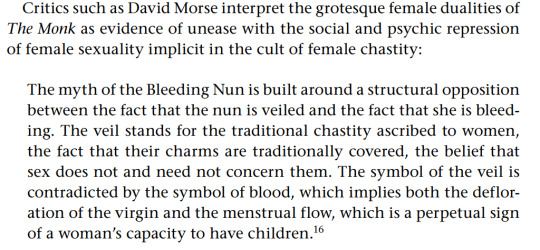
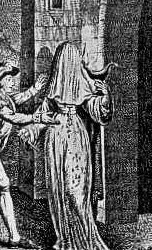
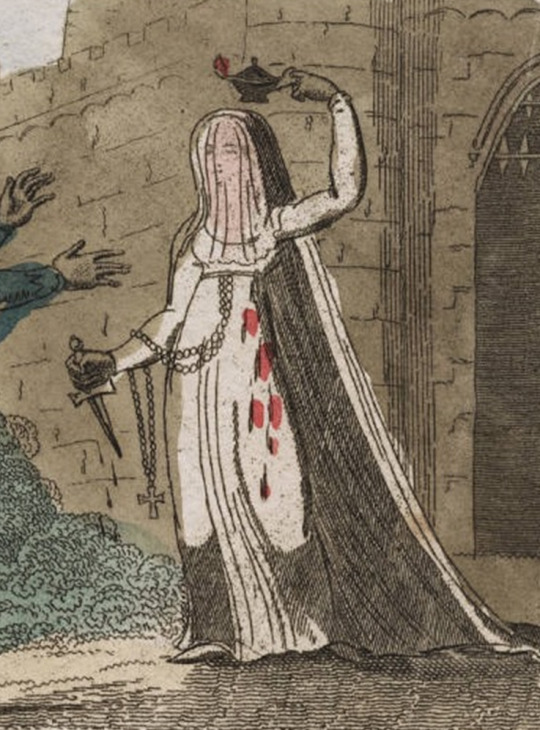
Angela Wright, ‘Disturbing the Female Gothic: An Excavation of the Northanger Novels’, in The Female Gothic: New Directions
Agnes ‘The Bleeding Nun’ from The Monk (1796)
341 notes
·
View notes
Note
hello!! do you have any recommendations for books or essays about becoming a better reader of poetry? I love the poems you post and esp love when your tags go into what you got out of it / understood from it, bc it’s always so much more than I was able to interpret on my own. and I want to become a better reader and learn how to really sit with a poem and get into all its layers but idk where to start.
I stand behind the recs in this post, but since you want to focus on poetry and poetics, in addition to William Empson's The Seven Types of Ambiguity and Helen Vendler's Poems, Poets, and Poetry, I'd also recommend Christopher Ricks' The Force of Poetry, I. A. Richards' Practical Criticism, and Jorge Luis Borges' The Craft of Verse. They are all beautifully written, by people whose love of the form transcends academia and becomes, at times, a kind of secular worship. I loved poetry before I fully understood language, back when it was just incomprehensible mouthwords my parents repeated to get me to sleep; I'd have loved poetry even if I never toiled a day in the hermeneutics mines, like my grandmother reciting Eugene Onegin after her dementia cleared everything else from the table—she wasn't sure what it meant, all she knew was that this was the nicest thing she had. Isn't that a kind of faith?
There are other good books about how to read poetry, but these were the ones that initiated me into a conspiracy of words, they taught me to be curious about why I liked a poem, how to take pleasure in its vivisection without worrying I'd kill that faith—like martyrs, good poems never fall apart when you open them up, they yield. If anything, the practice of explication has made me even more of a fanatic. I hope it does the same for you!
If there are poets you already like, I can get more specific about recs—I'm partial to modernist poetry, but that just means I like following breadcrumb trails of allusions to lots of different literary traditions and can tell you where the bodies, hatchets and/or treasures are buried.
#where's that bugs bunny meme that's like lord forgive me but it's time 2 go back to tha old me#but it's me about to reblog tha helen vendler emperor of ice cream explication#literary criticism#i read much of the night and go south in the winter#r-osehips#assbox#okay caveat the vendler and ricks books are definitely out of print but get them used—i promise they pay for themselves#in a hypothetical future where the economy crashes and poetry understanding becomes the most valuable form of currency
81 notes
·
View notes